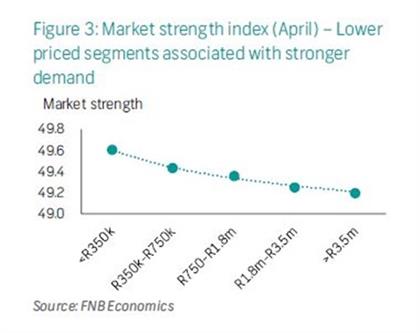House price growth slows to decade low as coronavirus throttles demand – economist
South Africa’s annual house price growth fell to 1.9{e93887a69cdd95d753f466db084bbc3aa0067124675315461d28d68a72842cc2} in April, down from 2.5{e93887a69cdd95d753f466db084bbc3aa0067124675315461d28d68a72842cc2} (revised from 2.8{e93887a69cdd95d753f466db084bbc3aa0067124675315461d28d68a72842cc2}) in March, according to the latest FNB Property Barometer released on Thursday.
This is the slowest pace since December 2009.
FNB property economist Siphamandla Mkhwanazi says the coronavirus pandemic will likely have a larger impact on transaction volumes than on price.
As a base case, he expects house prices to decline by around 5{e93887a69cdd95d753f466db084bbc3aa0067124675315461d28d68a72842cc2} and transaction volumes by around 45{e93887a69cdd95d753f466db084bbc3aa0067124675315461d28d68a72842cc2} this year. In comparison, prices declined by an average 1.5{e93887a69cdd95d753f466db084bbc3aa0067124675315461d28d68a72842cc2} (according to the FNB index) and transaction volumes by around 40{e93887a69cdd95d753f466db084bbc3aa0067124675315461d28d68a72842cc2} in 2009 during the global financial crisis.
Pressure is expected across all price segments, although Mkhwanazi foresees higher-end and luxury markets being hardest hit. This is partly due to pre-existing excess supply and depressed sentiment.
In contrast, he expects resilience in the affordable market. Demand in the lower end of the market is expected to be partly supplemented by homeowners in the middle market segments “buying down” due to the weak economic environment.
Since the implementation of nationwide lockdown in late March, market activity has almost ground to a halt with volumes plummeting by around 60{e93887a69cdd95d753f466db084bbc3aa0067124675315461d28d68a72842cc2} year-on-year in April and 62{e93887a69cdd95d753f466db084bbc3aa0067124675315461d28d68a72842cc2} compared to the last twelve months’ average monthly volumes.
The FNB index is constructed using mortgage approval data, and there is generally a lag between mortgage applications being submitted and approved. Approximately 60{e93887a69cdd95d753f466db084bbc3aa0067124675315461d28d68a72842cc2} of the April sample relate to applications that commenced prior to the lockdown.
“Economic activity is set to contract significantly in the near term, mainly as a direct result of the (necessary) measures adopted to suppress the spread of the virus,” says Mkhwanazi.
While the outlook remains highly uncertain, FNB estimates that GDP could contract by between 7{e93887a69cdd95d753f466db084bbc3aa0067124675315461d28d68a72842cc2} and 10{e93887a69cdd95d753f466db084bbc3aa0067124675315461d28d68a72842cc2}. This implies employment loss of at least 750 000.
On Wednesday, Business for South Africa said the country’s GDP could contract by between 10{e93887a69cdd95d753f466db084bbc3aa0067124675315461d28d68a72842cc2} and 16.7{e93887a69cdd95d753f466db084bbc3aa0067124675315461d28d68a72842cc2} this year despite government stimulus efforts, putting between 1 million and 4 million formal and informal sector jobs are at risk.
Nevertheless, FNB is hopeful that government policies adopted to support the economy could help limit long-term damage to the economy. “We expect a deeper contraction this year because of the nature of the shock, and the magnitude of the impact on labour markets. Recovery will likely be drawn out, due to pre-existing weaknesses in consumer fundamentals,” says Mkhwanazi.
“Historically low interest rates, a decline in house prices and lower transfer duties (particularly in the middle-priced segment) will eventually support purchasing activity and facilitate a house price rebound in 2021.”
* Compiled by Carin Smith

